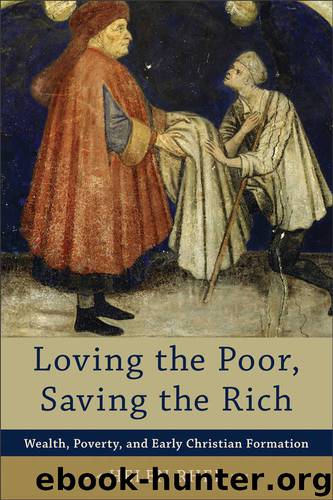Loving the Poor, Saving the Rich: Wealth, Poverty, and Early Christian Formation by Helen Rhee

Author:Helen Rhee [Rhee, Helen]
Language: eng
Format: azw3
Tags: REL033000, Church history—Primitive and early church (ca. 30–600), Wealth—Religious aspects—Christianity—History, REL108020, REL067070, Poverty—Religious aspects—Christianity—History
ISBN: 9781441238641
Publisher: Baker Publishing Group
Published: 2012-11-01T04:00:00+00:00
6.2. Christian Identity—Denunciation of Avarice and Luxury
In light of the generally negative tone of early Christian texts about business and commercial activities (perceived to be) motivated by unnatural greed, one can easily imagine that they would strongly denounce avarice and luxury (cf. chap. 2). This was not at all unique in a Christian circle. As mentioned in chapter 1, Greco-Roman and Jewish moralists characteristically condemned the twin vices of love of money and luxury. Nonetheless, Christian authors characterized the problem of avarice (love of money: pleonexia, philarguria, avaritia, cupiditas) essentially as idolatry (i.e., a theological problem even more than a moral problem, though they are usually intertwined; cf. Col. 3:5; Tertullian, Idol. 11.1) and thus as something intrinsically antithetical to Christian identity. The earliest extant sermon warns that “when we desire to acquire these [worldly] things, we fall away from the way of righteousness” (2 Clem. 5.7); and with dominical sayings on the impossibility of serving both God and money (cf. Luke 16:13; Matt. 6:24), it goes on to put them in an opposing relationship (6.1–5). Polycarp also admonishes the Philippians that unless they avoid avarice, they will be “polluted by idolatry, and will be judged as one of the Gentiles, who are ignorant of the Lord’s judgment” (Phil. 11.2), and Origen likewise repeats this close link between avarice and idolatry (Hom. in Judices 2.3; Hom. in Exodum 8.4).
In the context of addressing Christian patience in the face of many ills in life, including the loss of property, Tertullian frames his argument after the dominical example of indifference toward money (Pat. 7.2). The Lord “has set disdain for wealth ahead of the endurance of losses, pointing out through His rejection of riches that one should make no account of the loss of them” (Pat. 7.3). Tertullian interprets a familiar maxim of “the desire [cupiditas] of money [as] the root of all evils” (cf. 1 Tim. 6:10), to mean that desire of money here refers to “the desire for that which belongs to another” (concupiscentia alieni) and “even that which seems to be our own belongs to another” since God is the owner of all things (Pat. 7.5). Thus, if Christians fret and are impatient for their material loss, they “will be found to possess a desire for money, since [they] grieve over the loss of that which is not [their] own” (Pat. 7.6). When Christians are unable to bear their material loss, they sin against God Himself and behave like pagans by confusing the priority of heavenly goods over earthly ones (Pat. 7.7, 11). Just consider to what extent the pagans would go in order to pursue wealth: “they engage in lucrative but dangerous commerce on the sea; . . . they unhesitatingly engage in transactions also in the forum, even though there be reason to fear loss; they do it, in fine, when they hire themselves out for the games and military service or when, in desolate regions, they commit robbery regardless of the wild beasts” (Pat. 7.12). In
Download
This site does not store any files on its server. We only index and link to content provided by other sites. Please contact the content providers to delete copyright contents if any and email us, we'll remove relevant links or contents immediately.
The Gnostic Gospels by Pagels Elaine(2531)
Jesus by Paul Johnson(2362)
Devil, The by Almond Philip C(2332)
The Nativity by Geza Vermes(2230)
The Psychedelic Gospels: The Secret History of Hallucinogens in Christianity by Jerry B. Brown(2157)
Forensics by Val McDermid(2094)
Going Clear: Scientology, Hollywood, and the Prison of Belief by Lawrence Wright(1985)
Going Clear by Lawrence Wright(1968)
Barking to the Choir by Gregory Boyle(1822)
Old Testament History by John H. Sailhamer(1815)
Augustine: Conversions to Confessions by Robin Lane Fox(1773)
The Early Centuries - Byzantium 01 by John Julius Norwich(1745)
A History of the Franks by Gregory of Tours(1729)
A Prophet with Honor by William C. Martin(1725)
Dark Mysteries of the Vatican by H. Paul Jeffers(1723)
The Bible Doesn't Say That by Dr. Joel M. Hoffman(1681)
by Christianity & Islam(1634)
The First Crusade by Thomas Asbridge(1610)
The Amish by Steven M. Nolt(1574)
